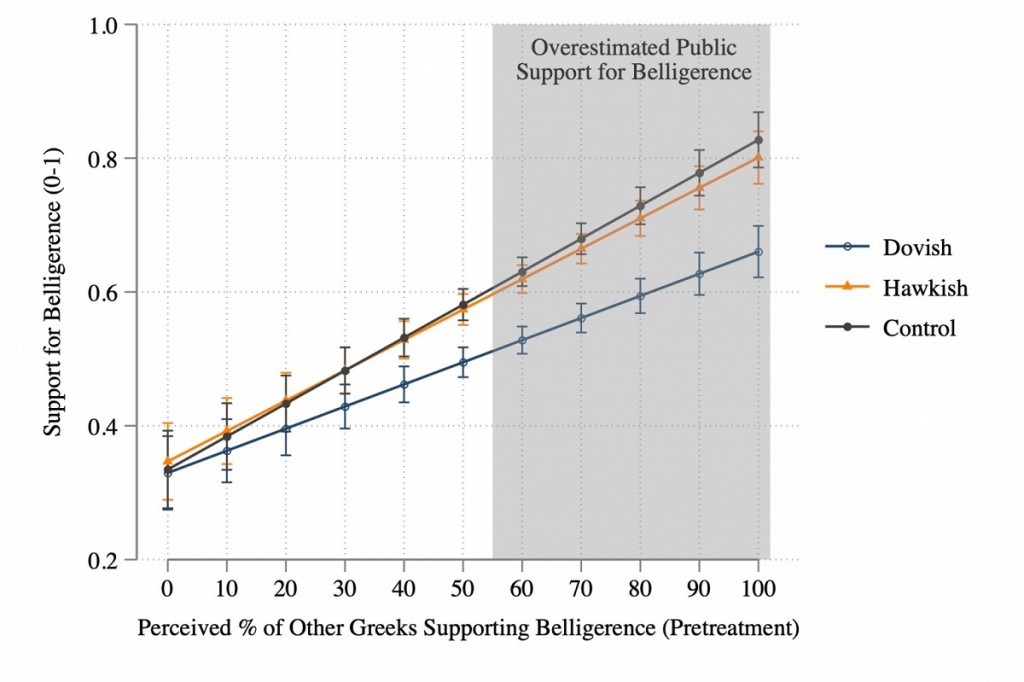Τhe recent visit to Athens by Turkish President Erdogan culminated in a Declaration of Friendship between Greece and Turkey, as the two leaders assured their publics that bilateral relations had entered a period of détente. And yet, just a year ago, many believed a militarized dispute was on the cards, due to unresolved rival claims to natural resources in the Eastern Mediterranean and the right to exploit and explore them. Conflicts over national sovereignty are perceived as threats to national identity, and such threats can easily foment nationalist competition and lead the Greek public to expect aggressive responses to Turkey’s threats. These nationalist responses can constrain politicians who might prefer to negotiate rather than fight, and thus increase the likelihood of conflicts escalating into violence. Yet, as we show in a recent study, these attitudes are driven in part by misperceptions about public opinion and what it means to be nationalist.
Our study explored the micro-foundations of public support for (hawkish) policies favoring military action versus (dovish) policies favoring diplomacy and negotiation with Turkey during a period of escalating tensions between the two countries in the period December 2021 to April 2023. These tensions were generated by a dispute over the boundaries of Greece’s and Turkey’s exclusive economic zones, which culminated in invasion threats from the Turkish president (“we will come at night”). The foreign policy studies literature tends to explain the escalation of such territorial disputes by focusing on political elites and ignoring the public at large. But why would elites support war if the public does not? And why would the public support belligerence, given the high costs of war?
A common answer to these questions is that leaders caught in a foreign policy dispute over national sovereignty have little leeway, since the public’s preference for hawkishness prevents them from supporting dovish responses to external threats; the assumption is that dovishness makes leaders look weak, which tarnishes the nation’s reputation and status. Our study calls that common assumption into question, finding that the Greek public prefers a dovish foreign policy when faced by a powerful enemy, and that many of those who support belligerence do so in the mistaken belief that the majority does so.
Our study was based on experimental interventions that shed new light on mechanisms of nationalist conflict escalation by exploring how perceptions of public opinion shape individuals’ own policy preferences. We presented several samples of adult Greek citizens from across the country with a hypothetical scenario in which Turkey began drilling operations in a part of the Eastern Mediterranean which Greece considers to belong to its exclusive economic zone. We then asked them whether they would support military action by Greece in response to that Turkish provocation. We also asked them what percentage of other Greeks would, in their opinion, support a hawkish foreign policy response.
We found that whether Greek citizens support belligerence toward Turkey depends to a large extent on whether they believe other Greeks would also support a hawkish policy. Moreover, we found a persistent gap between perceptions and reality across multiple surveys over a period of 18 months: whereas respondents believed that close to 70% of the population would support belligerence, the actual number was much smaller, sometimes as low as 17%. In fact, the vast majority of Greeks (up to 86% in some instances) overestimate how many other Greeks would actually prefer a hawkish foreign policy toward Turkey. This misperception is dangerous, as it pushes people to support hawkishness, even if they might actually prefer dovishness.
What happens when we correct prevailing misperceptions regarding the degree of support for belligerence among the public?
To answer that question, we manipulated perceptions of public opinion. No deception was involved: we simply presented selective facts and figures from our previous surveys of Greek public opinion. What we found was that our respondents’ support for belligerence declined when they were provided with accurate and substantiated information about the small percentage of Greeks who actually support belligerence.
The experiment exposed respondents to one of three randomly-selected conditions: a “hawkish” condition which affirmed prior assumptions regarding Greeks’ hawkishness toward Turkey; a “dovish” condition which provided new information showing that the majority of Greeks supports dovishness; and a “control” condition which provided no information regarding public opinion. The results (presented in Figure 1) show that support for belligerence (Y-axis) covaries with prior beliefs about the share of the public that also supports belligerence (X-axis), and that this association is weakened in the “dovish” condition relative to the two other conditions. Moreover, the “pacifying” effect of providing accurate information regarding the public’s dovish preferences is larger among people who severely over-estimate the public’s hawkishness.
It therefore follows that if there are no misperceptions regarding the public’s true preferences, the public’s tendency toward conformism during national crises could actually help to de-escalate conflicts, even during periods of rising tensions with a regional adversary.

Next, we explored why Greeks respond aggressively to threats to national identity? We used an incentivized survey to measure perceptions of group norms when national identity is threatened. We found that Greeks’ support for hawkishness is connected to the perception that an aggressive response to external threats to national identity is the normatively appropriate action–i.e. the action the majority of Greeks would approve. In other words, Greeks believe that other Greeks view belligerence as a prescribed behavior among people who care about their country and who want to protect their national power and status. In turn, this belief triggers a “conformist nationalism” which can even push people who might prefer dovishness to support belligerence, so as not to deviate from the group norm. At the same time, we found that respondents would prefer to support policies more dovish than those they believe others would support.
In a third experiment, we showed that a “shaming” mechanism is the most likely explanation for this type of conformism. Exposing a sample of International Relations students from six different Greek universities to a variant of the above experiment, we found that the effects of the dovish condition are amplified when students are made to think their peers might learn which policies they support toward Turkey, and when they have to defend their positions in public. Facing with potential public scrutiny, students abandon their previously belligerent preferences when they learn that the majority of Greeks actually support dovishness. This response derives from a psychological need not to diverge from the pack when it comes to supporting policies that are perceived as group norms in defense of national identity.
Overall, our research shows that a type of conformist nationalism defines a large segment of public opinion. It revealed that while this conformism can be dangerous, it can also be harnessed to de-escalate conflicts if prevailing misperceptions of public opinion are corrected. Our results identify a key role for the mass media in rationalizing and demystifying Greek-Turkish relations through the provision of accurate and substantiated information regarding the true share of the public who support diplomacy. Finally, our research suggests to the current—and any future—Greek government that they can adopt a policy based on dialog and negotiation without risking high audience costs, even during periods of high tensions with Turkey. Dovishness does not necessarily imply weakness, not least when it is the public’s own preferred policy.
The entire study can be found at: https://papers.ssrn.com/sol3/papers.cfm?abstract_id=4509924
See the publication in “To Vima”: https://www.tovima.com/politics/are-greeks-really-in-favor-of-a-hawkish-stance-toward-turkey/








 The session has ended for security reasons.
The session has ended for security reasons.